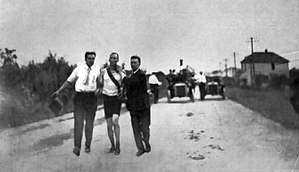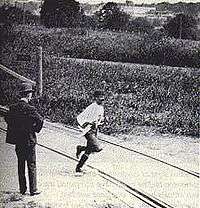Athletics at the 1904 Summer Olympics
At the 1904 Summer Olympics, twenty-five athletics events were contested. A total of 74 medals (25 gold, 25 silver, 24 bronze) were awarded.
| Athletics at the Games of the III Olympiad | |
|---|---|
| Venue | Francis Olympic Field |
| Dates | 29 August – 3 September |
| No. of events | 25 (25 men, 0 women) |
| Competitors | 233 from 10 nations |
| Athletics at the 1904 Summer Olympics | |
|---|---|
| Track events | |
| 60 m | men |
| 100 m | men |
| 200 m | men |
| 400 m | men |
| 800 m | men |
| 1500 m | men |
| 110 m hurdles | men |
| 200 m hurdles | men |
| 400 m hurdles | men |
| 2590 m steeplechase | men |
| 4 mile team race | men |
| Road events | |
| Marathon | men |
| Field events | |
| Long jump | men |
| Triple jump | men |
| High jump | men |
| Pole vault | men |
| Standing long jump | men |
| Standing triple jump | men |
| Standing high jump | men |
| Shot put | men |
| Discus throw | men |
| Hammer throw | men |
| 56 pound weight throw | men |
| Combined events | |
| Triathlon | men |
| All-around | men |
Multi-event competitions, the all-around and triathlon, were introduced. The short steeplechase was lengthened slightly, from 2500 to 2590 metres, while the long steeplechase was dropped. The 5000 metre team race was replaced with the 4 mile team race (6,437 m). A 56-pound weight throw was added. In all, the 25 events featured in 1904 were 2 more than were held in 1900.
Medal summary
Medal table
| Rank | Nation | Gold | Silver | Bronze | Total |
|---|---|---|---|---|---|
| 1 | 23 | 23 | 22 | 68 | |
| 2 | 1 | 1 | 0 | 2 | |
| 3 | 1 | 0 | 0 | 1 | |
| 4 | 0 | 1 | 0 | 1 | |
| 5 | 0 | 0 | 1 | 1 | |
| 0 | 0 | 1 | 1 | ||
| Totals (6 nations) | 25 | 25 | 24 | 74 | |
Participating nations
233 athletes from 10 nations competed. This figure includes the athletic triathlon event, which some sources exclude.
.svg.png)
.svg.png)

.svg.png)

.svg.png)
.svg.png)


.svg.png)
Marathon
The marathon was the most bizarre event of the Games. It was run in brutally hot weather, over dusty roads, with horses and automobiles clearing the way and creating dust clouds.[3]

The first to arrive at the finish line was Frederick Lorz, who actually rode the rest of the way in a car to retrieve his clothes, after dropping out after nine miles. The car broke down at the 19th mile, so he re-entered the race and jogged back to the finish line. When the officials thought he had won the race, Lorz played along with his practical joke until he was found out shortly after the medal ceremony and was banned for a year by the AAU for this stunt, later winning the 1905 Boston Marathon.[4]

Thomas Hicks was the first to cross the finish-line legally, after having received from his trainers several doses of strychnine sulfate (a common rat poison, which stimulates the nervous system in small doses) mixed with brandy. He was supported by his trainers when he crossed the finish, but is still considered the winner. Hicks had to be carried off the track, and possibly would have died in the stadium had he not been treated by several doctors. He lost eight pounds during the course of the marathon. A Cuban postman named Felix Carvajal joined the marathon, arriving at the last minute. He had to run in street clothes that a fellow runner cut around the legs to make them look like shorts. He stopped off in an orchard en route to have a snack on some apples which turned out to be rotten. The rotten apples caused him to have to lie down and take a nap. Despite falling ill from the apples, he finished in fourth place.[5][6]
References
- The IOC also lists a French immigrant to the US Albert Corey as a United States competitor for his marathon silver medal, but (together with four undisputed Americans) as part of a mixed team for the team race silver medal.
- Kiely is listed as having raced under a British Flag, despite representing Ireland.
- https://www.smithsonianmag.com/history/the-1904-olympic-marathon-may-have-been-the-strangest-ever-14910747/?no-ist
- Cronin, Brian (2010-08-10). "Sports Legend Revealed: A marathon runner nearly died". Los Angeles Times. Los Angeles.
- Abbott, Karen. "The 1904 Olympic Marathon May Have Been the Strangest Ever". Smithsonian.com. Retrieved April 8, 2015.
- Martin, David E.; Gynn, Roger W. H. (2000). The Olympic Marathon. Human Kinetics. p. 50. ISBN 9780880119696.